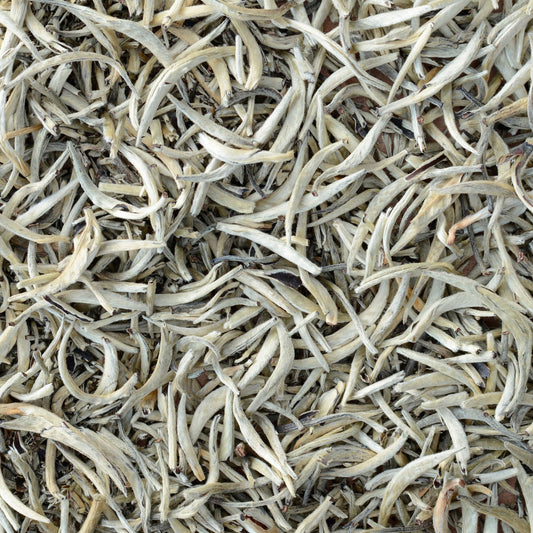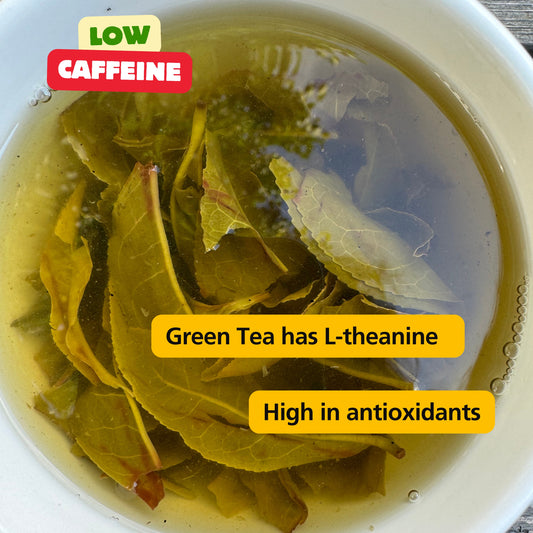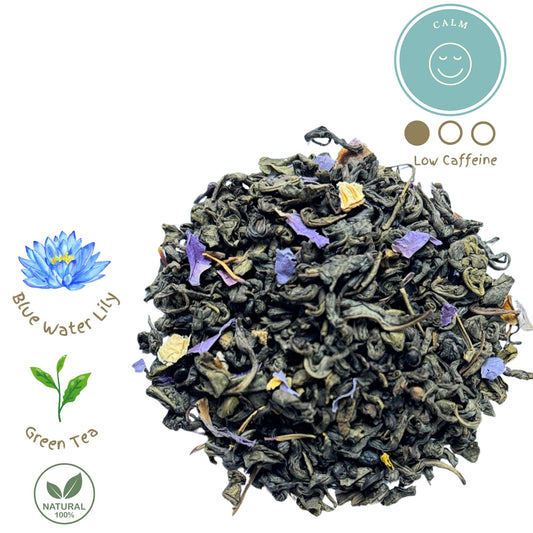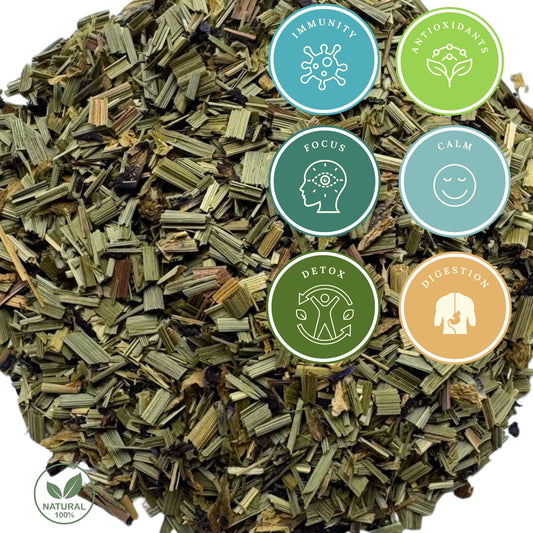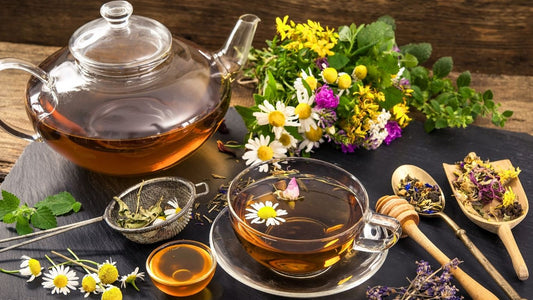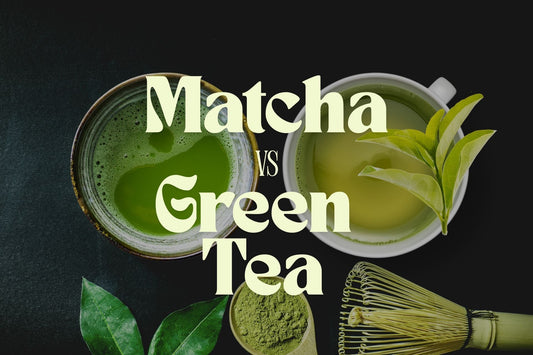Fight Inflammation with Tea
Natural Relief in Every Sip
Inflammation is your body's natural defence mechanism against injury, infection, or harmful stimuli.
But when inflammation becomes chronic, it can lead to long-term health concerns like arthritis, heart disease, diabetes, and even cancer.
Fortunately, nature provides powerful allies in the fight against inflammation—one of the most accessible being Tea.
Certain herbal and traditional teas are rich in anti-inflammatory compounds, including polyphenols, catechins, and flavonoids.
These natural substances help soothe your body from the inside out, reducing oxidative stress and supporting immune balance.
Whether you're managing joint pain, skin issues, gut inflammation, or simply trying to lower your risk of chronic disease, this guide introduces the top 10 teas to drink for inflammation, how they work, and how to brew them for maximum benefit.
1. Turmeric Tea
🌿 Why Turmeric Tea is Anti-Inflammatory:
Turmeric contains curcumin, one of the most potent natural anti-inflammatory compounds known to science. Curcumin works by blocking NF-kB, a molecule that activates inflammation in your cells.
Health Benefits of Turmeric Tea :
- Reduces joint pain and arthritis symptoms
- Supports liver function
- Boosts immunity
☕ How to Brew Turmeric Tea :
Steep 1 teaspoon of ground turmeric or 1 inch of fresh turmeric root in hot water for 10 minutes. Add a pinch of black pepper (to enhance curcumin absorption) and lemon or honey for taste.
2. Ginger Tea
🌿 Why Ginger Tea is Anti-Inflammatory:
Ginger contains gingerol, a potent compound that targets inflammation at the cellular level, especially in the digestive tract and joints.
Health Benefits of Ginger Tea:
- Eases muscle soreness and menstrual pain
- Supports digestion
- Reduces nausea and bloating
☕ How to Brew:
Slice a few thin pieces of fresh ginger root and simmer in water for 10–15 minutes. Add lemon or cinnamon for a warming twist.
3. Green Tea
🌿 Why Green Tea Anti-Inflammatory:
Rich in catechins and particularly epigallocatechin gallate (EGCG), green tea fights inflammation and oxidative stress while supporting metabolic health.
Health Benefits of Green Tea:
- Supports brain function and memory
- Reduces belly fat and cholesterol
- Fights cellular aging
☕ How to Brew Green Tea:
Steep 1 teaspoon of green tea leaves or 1 tea bag in water at 160–180°F (not boiling) for 2–3 minutes. Avoid over-brewing to reduce bitterness.
so gud™ Green Tea is sustainably grown and packaged, offering a planet-friendly way to support your wellness goals.
4. Chamomile Tea
🌿 Why Chamomile Tea Anti-Inflammatory:
Chamomile is rich in apigenin, a flavonoid that helps reduce inflammation and promotes relaxation.
Health Benefits of Chamomile Tea:
- Soothes digestive inflammation (like IBS)
- Relieves stress and anxiety
- Helps with sleep and insomnia
☕ How to Chamomile Tea:
Steep dried chamomile flowers or a tea bag in hot water for 5–7 minutes. Add honey or vanilla for a gentle, calming flavor.
5. Peppermint Tea
🌿 Why Peppermint Tea is Anti-Inflammatory:
Peppermint contains menthol and rosmarinic acid, which help relax muscles and reduce inflammation in the digestive tract and respiratory system.
Health Benefits of Peppermint Tea:
- Eases bloating, cramps, and nausea
- Supports sinus health
- Improves focus and concentration
☕ How to Brew Peppermint Tea:
Steep fresh peppermint leaves or a peppermint tea bag in hot water for 5–10 minutes. Enjoy after meals for digestive support.
6. Rooibos Tea
🌿 Why Rooibos Tea is Anti-Inflammatory:
Caffeine-free and rich in aspalathin and quercetin, rooibos is a South African herbal tea that helps reduce inflammation and oxidative stress.
Health Benefits of Rooibos Tea:
- Supports heart health
- Balances blood sugar
- Promotes healthy skin
☕ How to Brew Rooibos Tea:
Steep for 5–7 minutes in freshly boiled water. Its naturally sweet flavor pairs well with citrus or vanilla.
💚 Rooibos is also a great caffeine-free choice for evening routines or those sensitive to stimulants.
7. Hibiscus Tea
🌿 Why Hibiscus Tea is Anti-Inflammatory:
Hibiscus is high in anthocyanins—the same antioxidants found in berries—which fight free radicals and lower inflammation.
Health Benefits of Hibiscus Tea:
- Lowers blood pressure
- Supports liver detox
- Fights bacterial infections
☕ How to Brew Hibiscus Tea:
Steep dried hibiscus petals or tea bags in hot water for 5–10 minutes. It brews a beautiful deep red and is delicious served iced with a slice of lime.
8. Matcha Tea
🌿 Why Matcha Tea is Anti-Inflammatory:
Matcha is a powdered green tea packed with EGCG, chlorophyll, and L-theanine. Because you consume the whole leaf, it delivers more antioxidants than steeped green Tea.
Health Benefits of Matcha Tea:
- Boosts metabolism and energy
- Enhances mood and focus
- Detoxifies naturally
☕ How to Brew Matcha Tea:
Whisk ½ teaspoon of matcha powder into hot (not boiling) water until frothy. Add steamed oat milk or coconut milk for a creamy anti-inflammatory matcha latte.
🌱 Look for organic ceremonial-grade matcha for the highest quality.
9. Holy Basil (Tulsi) Tea
🌿 Why Holy Basil (Tulsi) Tea is Anti-Inflammatory:
Used in Ayurvedic medicine, Tulsi is an adaptogen that helps the body handle stress and inflammation. Its oils contain eugenol and ursolic acid, both of which are known for their anti-inflammatory activity.
Health Benefits Holy Basil Tea:
- Lowers cortisol (stress hormone)
- Reduces inflammation in joints and organs
- Strengthens immunity
☕ How to Brew Holy Basil Tea:
Steep dried tulsi leaves or a tulsi tea bag in hot water for 10 minutes. Combine with ginger or cardamom for added benefits.
10. Moringa Tea
🌿 Why It's Moringa Tea is Anti-Inflammatory:
Known as the "miracle tree," moringa is loaded with isothiocyanates, quercetin, and vitamin C, which combat inflammation and oxidative damage.
Health Benefits Moringa Tea:
- Fights inflammation at a cellular level
- Enhances liver detox
- Supports healthy blood sugar and cholesterol
☕ How to Brew Moringa Tea:
Steep moringa tea bags or dried leaves in hot water for 5–7 minutes. Add lemon or honey for taste.
🍃 Simply Moringa™ by so gud™ is your daily ritual for inflammation support, made from sun-dried moringa grown without pesticides.
🌿 Bonus Tip: Combine Teas for Maximum Benefits
Many of these teas can be blended together for an even more powerful anti-inflammatory effect. Try:
- Ginger + Turmeric + Lemon
- Chamomile + Peppermint
- Green Tea + Tulsi
- Hibiscus + Rooibos + Orange Peel
Brewing your own anti-inflammatory blend lets you customize based on your preferences and health goals.
The Science Behind Anti-Inflammatory Teas
So, how exactly do these teas help?
- Polyphenols & Flavonoids: Found in green, black, and herbal teas, these antioxidants neutralize free radicals that cause inflammation.
- Adaptogens: Like tulsi and moringa, help regulate stress responses, lowering cortisol and systemic inflammation.
- Essential Oils: In ginger, peppermint, and turmeric, they calm digestive and muscular inflammation.
- Vitamins & Minerals: Some teas, especially moringa and hibiscus, are rich in natural vitamins that support immunity and repair.
so gud™ Tea: Made for Wellness, Designed for the Planet
At so gud™, we believe that fighting inflammation shouldn't come at the cost of harming the planet. That's why our teas:
- Come in plastic-free, compostable tea bags.
- Use real natural herbs, spices, and whole leaves—no flavoring powders or synthetic additives.
- Are hand-harvested and ethically sourced.
- Support regenerative farming and community wellness initiatives.
Every cup you sip does good for your body—and the world.
Frequently Asked Questions
1. When is the best time to drink Tea for inflammation?
Mornings are great for green or matcha tea. Evenings are ideal for calming teas like chamomile or tulsi. Ginger and turmeric can be enjoyed any time, especially after meals.
2. How many cups a day should I drink?
2–3 cups per day is safe and effective for most people. Listen to your body and consult your healthcare provider if you're on medication.
3. Can I drink Tea instead of taking anti-inflammatory pills?
Tea can support inflammation management, but it's not a replacement for medical treatment. It works best alongside a healthy diet and lifestyle.
4. Is caffeine a concern in these teas?
Green Tea, matcha, and black teas contain caffeine. Herbal teas like chamomile, tulsi, rooibos, and peppermint are naturally caffeine-free.
Final Thoughts: Sip Your Way to Less Inflammation
Nature has always provided healing tools—and Tea is one of its most powerful gifts. From the bold punch of turmeric to the gentle calm of chamomile, there's a tea to meet every inflammation challenge. By incorporating a few of these into your daily routine, you're choosing a simple, enjoyable way to support your body.
At so gud™, our mission is to create teas that taste good, feel good, and do good—for you and the planet.
Ready to fight inflammation with flavor?
Explore our anti-inflammatory tea collection at www.sogud4u.com and discover blends designed to heal, nourish, and uplift.
so gud™ Teas: Made with Plants. Packaged without Plastic. Brewed for Better Living.











